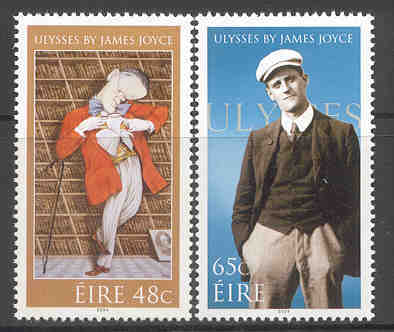AN EXCERPT FROM THE PREFACE OF MY THESIS ON JAMES JOYCE'S 'ULYSSES'
In 2006, the poet laureate Andrew Motion recommended that all schoolchildren read ‘Ulysses’ as part of their essential grounding in English literature. One can see why. To read ‘Ulysses’is to realize that the whole of twentieth-century literature is little more than a James Joyce Appreciation Society. Among the many writers who would have been different, or even nonexistent, without ‘Ulysses’, are Samuel Beckett, Jorge Louis Borges, Dylan Thomas, Flann O’Brien, Anthony Burgess, Salman Rushdie, Umberto Eco, Italo Calvino, Philip K. Dick and Bernard Malamud --- to name but a few. Even a writer as unlikely as George Orwell deliberately echoed the ‘Circe’ episode of ‘Ulysses’ in the play scene of ‘A Clergyman’s Daughter’. Joyce’s hectic layering of styles, his unstoppable neologizing, his blurring of viewpoint, his love of parody and imitation, his obscenity, his difficulty, obscurity and outright incomprehensibility was the beginning of the high modernist style in world literature. Andrew Motion was right in seeing ‘Ulysses’ as fundamental, but in another way his suggestion was absurd. ‘Ulysses’ is not a book for children. It is barely even a book for adults. The paradox of ‘Ulysses’ is that one needs to read it to understand twentieth-century literature, but one needs to read twentieth-century literature to build up the stamina to read ‘Ulysses’.
 JOYCE ON IRISH STAMP
JOYCE ON IRISH STAMPThe problem starts with the title. Early readers of ‘Ulysses’, exhilarated and appalled after 800 pages, were often still left thinking “Why ‘Ulysses’?” The word ‘Ulysses’ is barely mentioned. The name is mentioned four times, twice in passing as a proper name, Ulysses Grantand Ulysses Browne, and twice as a brief mention among other heroes and notables. The occurances are cited below :---
“What softens the heart of a man, shipwrecked in storms dire, Tried, like another Ulysses, Pericles, prince of Tyre?”2. “ He puts Bohemia on the seacoast and makes Ulysses quote Aristotle .”3. “AndSarsfieldandO’Donnell, dukeofTetuaninSpain, andUlyssesBrowneof Camus that was fieldmarshal to Maria Teresa .” 4. “ when general Ulysses Grant whoever he was or did supposed to be some great fellow landed off the ship ”David Lodge in ‘The Art of Fiction’wrote that the title, as a clue to the allegorical nature of the book, was “the only absolutely unmissable one in the entire text”.Each episode is assigned, tacitly, a colour theme, a dominant organ of the body, an hour, a setting, and other characteristics, though many of these remain a matter of scholarly dispute. The action takes place in Dublin on a single June day (June 16th 1904) and its three main characters are Leopold Bloom, Stephen Dedalus and Molly Bloom, who represent Ulysses, Telemachus and Penelope, respectively. Other characters and places also have their Homeric counterparts.
 JOYCE ON IRISH 10 POUND NOTE
JOYCE ON IRISH 10 POUND NOTEThe problem is that one can know all of this and still be left thinking “Why ‘Ulysses’?” The choice of the ‘Odyssey’seems somewhat arbitrary. Why not ‘Oedipus Rex’ as a background text? That way Bloom could be Oedipus, Molly Jocasta and Dedalus Tiresias (or someone else). ‘Ulysses’is not so much a novel as a symbolic system, rather like a clock or a computer programme. Underlying the final, visible product, the time-telling or the computer display, is a corresponding machinery, the cogs or the binary code. Why did Joyce choose the ‘Odyssey’ for his code?
The answer is that it could hardly have been anything else. Joyce was from an early age deeply in love with the ‘Odyssey’. “The character of Ulysses has fascinated me ever since boyhood,” he wrote to Carlo Linati in 1920.“It, withtheprecedingsceneandwithothersunnarratedbutexistentbyimplication, towhichaddessaysonvarioussubjectsormoralapothegms(e.g. MYFAVOURITEHEROORPROCRASTINATIONISTHETHIEFOFTIME) composedduringschoolyears,”He later described Ulysses to Frank Budgen, in an interview in 1934, as the only “complete all-round character presented by any writer”.Unsurprisingly therefore, this “complete man” surfaced as early as Joyce’s first major prose work --- ‘Dubliners’ --- of 1914. Joyce had originally planned that it would include a short story called ‘Ulysses’, the plot of which was based on an incident which took place in June 1904. Joyce was involved in a scuffle on St Stephen’s Green, Dublin, after accosting another man’s lady-companion, and was rescued and patched up by one Alfred H. Hunter. Hunter, according to Joyce’s biographer, Richard Ellmann, was “rumoured to be Jewish and to have an unfaithful wife”
[i] Joyce, James; ‘Ulysses’; Project Gutenberg edition ; Scylla and Charybdis; (9327-9329)Credits : e-book produced by Col ChoatE-Text No. : 4300Release Date : 2003-07-01Base Directory : http://www.gutenberg.org/files/4300/D... Source : http://www.gutenberg.org/etext/4300/This e-book is based on the pre-1923 print editions.[Project Gutenberg, is a volunteer effort to digitize and archive cultural works, to encourage thecreation and distribution of e-books. Founded in 1971 by Michael S. Hart, it is the oldest digitallibrary. Most of the items in its collection are the full texts of public domain books. The projecttries to make these as free as possible, in long-lasting, open formats that can be used on almost anycomputer. As of March 2009[update], Project Gutenberg claimed over 28,000 items in its collection.Project Gutenberg is affiliated with many projects that are independent organizations which sharethe same ideals, and have been given permission to use the Project Gutenberg trademark.Wherever possible, the releases are available in plain text, but other formats are included, such asHTML, PDF, EPUB, MOBI and PLUCKER. Most releases are in the English language, but manynon-English works are also available. There are multiple affiliated projects that are providingadditional content, including regional and language-specific works. Project Gutenbergis alsoclosely affiliated with Distributed Proofreaders, an internet-based community for proofreadingscanned texts.]
Published on June 17, 2012 12:57
No comments have been added yet.



